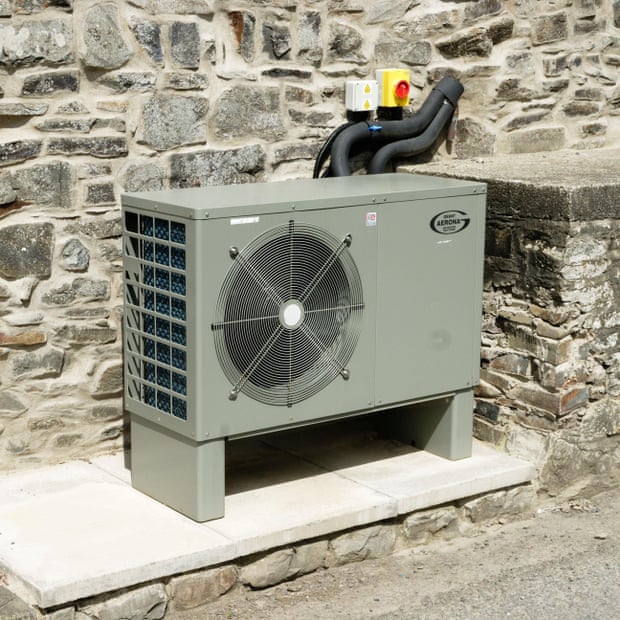Cutting carbon emissions in the home is a key part of the UK’s drive to meet net zero climate targets and one of the most promising alternatives to a domestic gas boiler is a heat pump, which uses electricity to channel warmth from the ground or the air into the home.
Yet although heat pumps can transform 1 kilowatt of green electricity into 3kW-worth of heat, their benefits have been overshadowed by concerns about cost, and uptake has been low.
The government’s aim is to have 600,000 heat pumps a year being installed by 2028. But only 55,000 were fitted in 2021, while 1.5m gas boilers were installed.
A £450m scheme offering grants of £5,000 towards the cost of a heat pump was launched last May to a tepid response. Figures released last week by Ofgem show that by the end of March the scheme had only managed to give out slightly more than a third of the grants available for the financial year. It issued just 11,996 vouchers out of the 30,000 available, of which 9,981 were redeemed – equivalent to £50.16m of the £150m of grants on offer annually for the next three years.
So why has the UK’s home decarbonisation strategy gone cold and what can be done to restart it?
The blame for the “disappointingly low” take-up lies mostly with the government, according to a recent parliamentary report. In a letter to ministers, the House of Lords environment and climate change committee said public awareness of low-carbon heating systems was “very limited” and promotion of the scheme had been “inadequate”. A shortage of installers and “insufficient independent advice” were also hindering take-up, the committee said.
Q&A
What are heat pumps and why is the UK government pushing them?
Show

In simple terms, an electric heat pump works like a reverse fridge, extracting warmth from the outside air, the ground or a nearby water source before concentrating the heat and transferring it indoors. They can usually be found outside a home, and they look like a standard air-conditioning unit.
About 85% of UK homes use gas boilers for heating, making it one of the most polluting sectors of the economy. The fossil fuels used in our homes for heating, hot water and cooking make up more than a fifth of the UK’s carbon emissions, meaning low-carbon alternatives are critical if the UK government hopes to meet its climate targets.
Jillian Ambrose
Then there is the issue of cost. Even with a £5,000 grant, households still need to pay the balance of the upfront cost of installing a pump, which is on a par with many new boilers and can be too great for households to bear. The technology works best in homes which are well insulated and warmed by wide radiators. This is true of boilers too, but a heat pump is less able to mask an inefficient heating system, meaning extra upgrades costing thousands of pounds may be required before installing the pump itself. The government’s plans to improve energy efficiency and insulation have also been sluggish and widely criticised.
Britain sold the fewest heat pumps relative to population size in Europe last year, according to the European Heat Pump Association. Such resistance runs decades deeper than recent concerns over costs and logistics, according to Dave Sowden of energy consultancy Gemserv. “The reason the UK is different from the rest of Europe is that it has got the most dense penetration of the gas network of all European countries and, with that, easy access to gas for heating and cooking,” he says. “Boilers have become really popular in the UK and that is what people have got used to. There is a fear of the unknown, and some of that fear is unfounded.”
Britain’s earliest central heating boilers, installed between the 1960s and 1980s, typically ran at very high temperatures. This has set up an expectation that a well functioning heating system should be able to deliver strong blasts of heat on demand, Sowden says. By contrast, a heat pump gently maintains the ambient temperature of a room by using more efficient, lower-temperature top-ups through the day.
“People think a heating system isn’t ‘on’ if they touch a radiator and it doesn’t burn their hand,” he says. “But it doesn’t need to be belting out heat to keep a room at a comfortable temperature.”
In fact, by running at lower temperatures with more consistency, a heat pump is able to be more efficient and help save households money over its lifetime. “Thinking about the lifetime cost is well understood when we’re talking about cars but it’s not so well understood for heating systems,” Sowden adds.
Things may be beginning to change. Jan Rosenow, a director at the Regulatory Assistance Project, an energy thinktank, believes a planned tweak to energy levies could make all the difference. The government plans to shift the collection of green levies from electricity bills to gas bills, which could tip the balance in favour of heat pumps by making relying on gas more expensive.

“Government has announced a review of how levies are attributed to electricity versus gas bills and will put forward reforms later in the year,” he says. “This will help drive heat pump uptake.”
Already, Octopus Energy claims to have a waiting list of about 50,000 households interested in having a pump installed. The energy company is training up hundreds of installers at UK bases to help meet demand, and has invested in a Northern Ireland based heat pump manufacturer, Renewable Energy Devices, to produce around 1,000 pumps every month.
“The government’s boiler upgrade scheme has catalysed massive growth in the market,” according to Clementine Cowton, Octopus’s director of external affairs. “In terms of total numbers, the UK still lags the rest of Europe but the take-up is becoming much faster.”
She expects heat pump installations to benefit from the “virtuous circle of scale and demand” that has helped to drive down the cost of gas boilers in the past. As more heat pumps are installed, the costs will fall, she says, and as costs begin to fall, more households will opt to install a heat pump.
A price war could quicken the pace. Octopus’s biggest rival in this respect is British Gas, the UK’s largest energy supplier, which has offered a starting price for installation of £2,999 – taking into account the £5,000 grant – or £1 less than Octopus’s cheapest deal.
Octopus says it has since installed heat pumps for as little as £2,300, including the government grant, although a typical household pays between £3,000 and £4,000 depending on how powerful a heat pump is required. “The idea is that eventually we stop needing a grant altogether. Soon buying and running a heat pump will be cheaper than a gas boiler – without a subsidy,” says Cowton.









